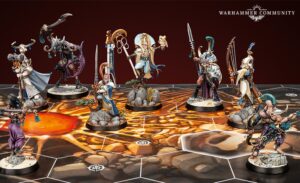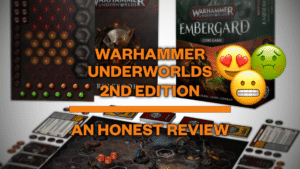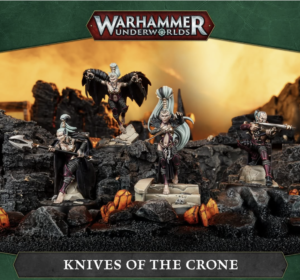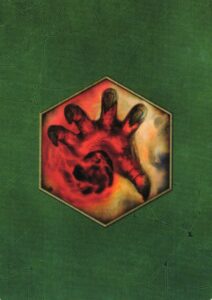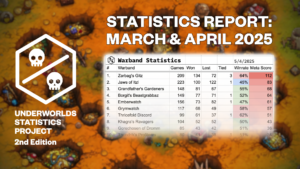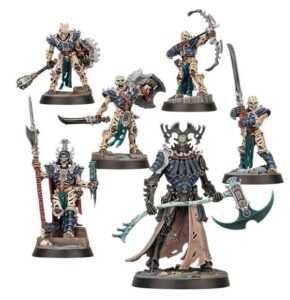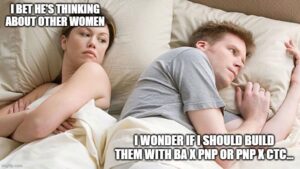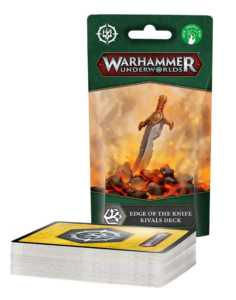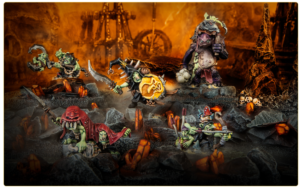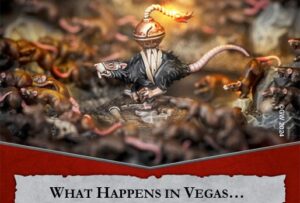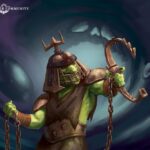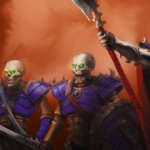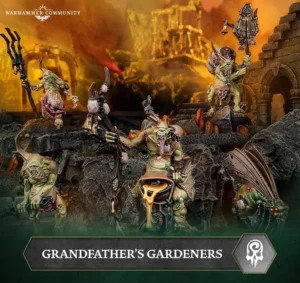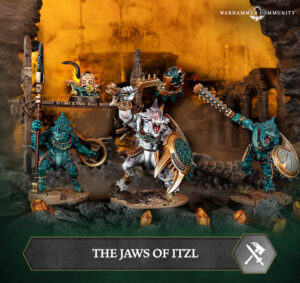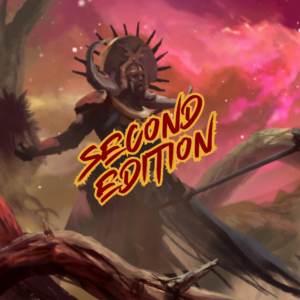Intro
Hello and welcome back for another serving of Bacon’s Bits, the article series where I get to dig into a niche Underworlds topic and weigh in with my opinion. I’m very excited for today’s topic, which is how to play mind games in Warhammer Underworlds. With so much narration of what you are doing and how much open information there is in the game, it can be easy to forget that your opponent is lacking certain key pieces of information. In doing so, we often also neglect the ability to let what we do and say impact how our opponent is going to play the game. Very often, players will perform better in person rather than online just because they can leverage their ability to read people and conceal their intentions better than their opponents. While you do, of course, need to follow the rules of the game, the rules give you a lot of leeway to mess with your opponent’s head if you are willing to take the opportunity.
Plot Cards and Nemesis Pairings
We have to start with this one because I see it done incorrectly so often. There are plenty of occasions where two players sit down at the table to start their Bo3, then say “oh I’ve got XYZ warband with blah-blah Rivals deck” and their opponent responds in kind. While this is all well and good, the rules do not require you to declare what Rivals deck you are playing, they require you to declare any plot cards you are using. For Nemesis, if you have chosen a universal deck with a plot card, declaring what plot you have and what deck you are using is synonymous. However, I can’t tell you how many times I’ve sat down, declared my plot card, and then had my opponent respond with “oh I’m playing Force of Frost” or some other plotless deck. While I appreciate the free intel, this is technically not open information, which means when you are playing a plotless deck the only thing you need to do is politely reply “I have no plot card to declare.” Some people will still try to cajole you into telling them what you’re playing out of some backwards sense of “equity” since they had to reveal their plot card, but I cannot stress enough that you do NOT have to tell them what deck you’re using if it is plotless. You might think it a bit silly, since often it will become clear which deck you are paired with by the end of Round 1 of the first game, if not sooner, but you will always, at minimum, have an informational advantage until the end of board and objective placement in the first game. Why throw that away?
In a very simple example, let’s look at plotless Thricefold Discord. There are, in my opinion, three plotless decks which can work to decent competitive effect with them in Nemesis: Seismic Shock, Force of Frost, and Rimewyrm’s Bite. All 3 of these have some different counterplay considerations during board and objective placement. If the 3XD player is using Seismic Shock, you’ll need to worry about situations where they can end up with only 2 objective tokens in their territory, as this can potentially unlock a more feasible [![]() Claim the Prize]
Claim the Prize]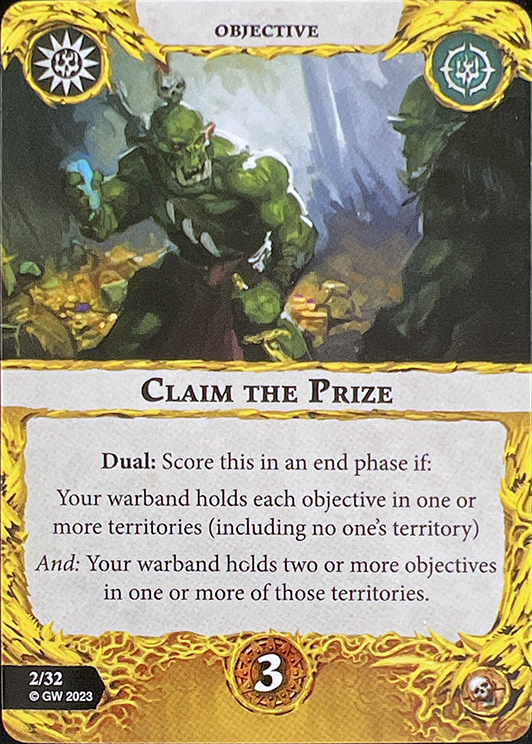 score. If they are playing Force of Frost, you likely don’t want to use a board that has printed blocked hexes, as these can be used to activate cards like [
score. If they are playing Force of Frost, you likely don’t want to use a board that has printed blocked hexes, as these can be used to activate cards like [![]() Iara’s Frozen Bonds]
Iara’s Frozen Bonds]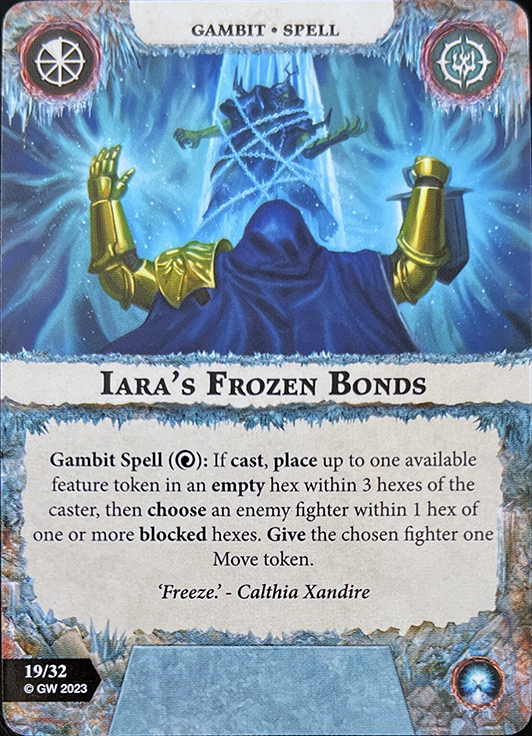 , [
, [![]() Flash Flood]
Flash Flood]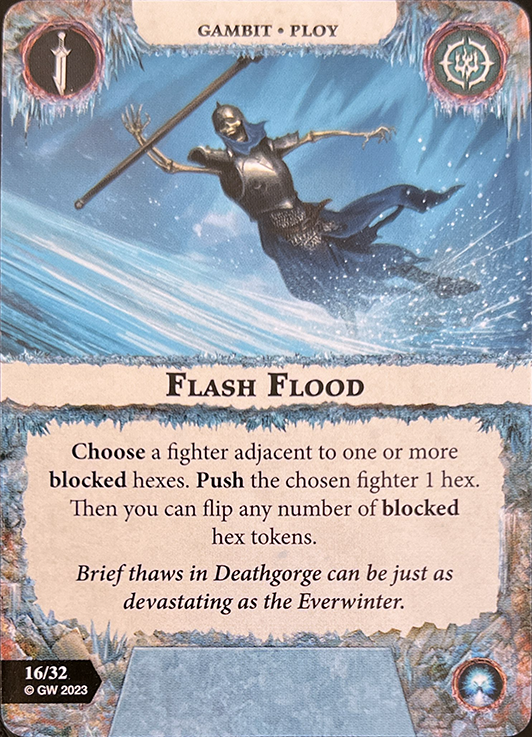 , and [
, and [![]() Freeze-thaw Finish]
Freeze-thaw Finish] . Meanwhile, if they are playing Rimewyrm’s Bite, placing boards with printed hazard hexes can pose an issue, as they can open up [
. Meanwhile, if they are playing Rimewyrm’s Bite, placing boards with printed hazard hexes can pose an issue, as they can open up [![]() Puncturing Ice Shards]
Puncturing Ice Shards] or [
or [![]() Nowhere to Run]
Nowhere to Run] (in the case of lethals). Furthermore, depending on the pairing, spellcasting may feature more (or less) heavily in the deck, meaning Vashtiss, in particular, becomes much more (or less) important to the 3XD player’s gameplan. If you’re the 3XD player, wouldn’t you much rather have your opponent second guessing all of that during setup rather than knowing exactly what you’re up to? You might even be playing none of these decks and be running something off-meta like Paths of Prophecy instead. Don’t spoil the surprise until you either have to mulligan your universal cards or play one of them. It is a slight, yet underutilized advantage.
(in the case of lethals). Furthermore, depending on the pairing, spellcasting may feature more (or less) heavily in the deck, meaning Vashtiss, in particular, becomes much more (or less) important to the 3XD player’s gameplan. If you’re the 3XD player, wouldn’t you much rather have your opponent second guessing all of that during setup rather than knowing exactly what you’re up to? You might even be playing none of these decks and be running something off-meta like Paths of Prophecy instead. Don’t spoil the surprise until you either have to mulligan your universal cards or play one of them. It is a slight, yet underutilized advantage.
Monitoring Something Pointlessly
This is another funny one you can do that can put some strain on your opponent. As long as you’re following the rules, there’s nothing wrong with counting stuff. You can count how many spells you’ve cast, keep sifting through your discard piles, or stack up way more Command counters than you plan to actually use to your heart’s content, all just to make your opponent think you are trying to do something that you are not. The best example of this is probably exploration count. Many Daring Delvers decks either do not care whether their count has exceeded let’s say 5, or flat out do not care about the count at all. Well, that doesn’t mean you should stop counting it. Not only is it technically correct to count any instance of your count increasing or decreasing, but continuing to count it up will make your opponent start sweating, especially on Gravebreakers, where your count should easily get to 7 or 8 by the end of most games. The closer that count starts to get towards 10, the more your opponent has to think “oh shoot, what if they’ve got [![]() Uncovered Secrets]
Uncovered Secrets]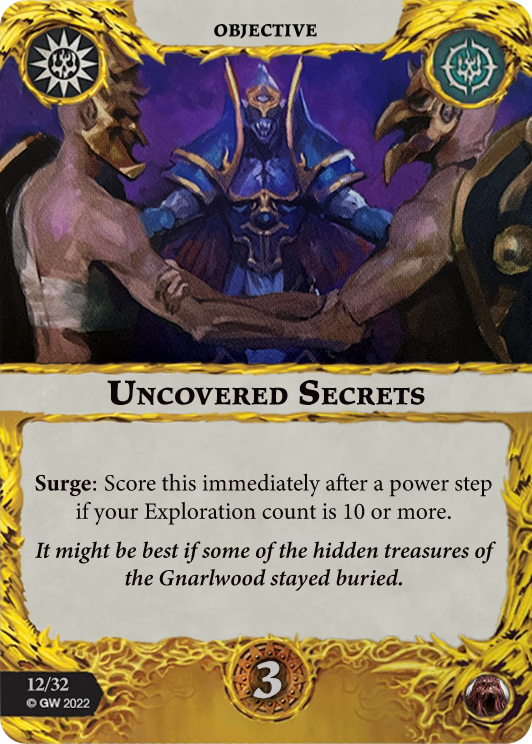 ?” This can potentially lead them to take risky plays trying to deny objectives that you may not even have in your deck. Again, it’s a niche use case that may only give you a slight edge, but an advantage is an advantage. Funny how simply following the rules can sometimes act as a red herring like this though.
?” This can potentially lead them to take risky plays trying to deny objectives that you may not even have in your deck. Again, it’s a niche use case that may only give you a slight edge, but an advantage is an advantage. Funny how simply following the rules can sometimes act as a red herring like this though.
Body Language and Verbal Cues
This is probably the most important part of playing in person. While you have to be careful not to do it too frequently, even just working your thought process out verbally can be enough to squeeze some information out of your opponent. Mumbling to yourself something about, “hmm, well if you have [![]() Quickroots]
Quickroots]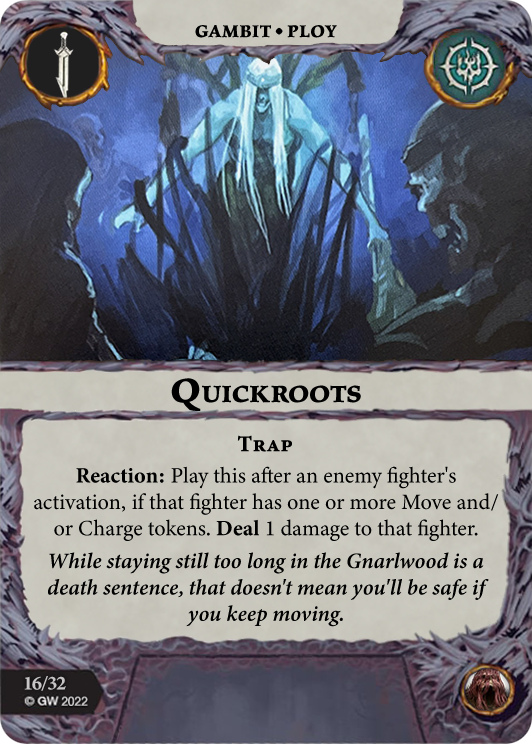 in your hand then that might not work…” then gauging their physical response can be a sneaky way to extract some information. I would try to limit your use of stuff like this because you can very quickly get into the territory where you are just annoying your opponent more than anything else, but every now and then you get just enough information out of them to make an actionable decision. On the flip side, this is why it is very important to keep your composure and a stoic expression in game. Your opponent should also be trying to read you, so revealing too much with your expressions/commentary can hurt you.
in your hand then that might not work…” then gauging their physical response can be a sneaky way to extract some information. I would try to limit your use of stuff like this because you can very quickly get into the territory where you are just annoying your opponent more than anything else, but every now and then you get just enough information out of them to make an actionable decision. On the flip side, this is why it is very important to keep your composure and a stoic expression in game. Your opponent should also be trying to read you, so revealing too much with your expressions/commentary can hurt you.
That being said, bluffing is a perfectly fine thing to do in this game. Now, when your opponent asks you for something that is open information like which upgrades a fighter has, you tell them the truth, full stop. I would say you even go so far as to explain what each of them does in these cases. Heck, if your opponent asks you about what the wording on a card is that is not currently on the table, I would say you should even tell them that as well. That’s just good sportsmanship. What I am talking about is suggesting—whether through verbal, somatic, or in-game clues—that you are attempting to do something that you may not actually be trying to do.
My favorite example of this was actually when I was playing against my brother in a local Championship tournament right at the beginning of Gnarlwood. I was playing Magore’s Fiends and he had Exiled Dead. In games 1 and 2, I had been fortunate enough to draw [![]() Goreswamp]
Goreswamp] into my opening hand, which completely derailed his first round in both games. So, when Game 3 rolled around, I drew my power hand, knew I was going to keep it, but just immediately started laughing. He starts laughing too and says something to the effect of “oh no, you drew it again!” He manages to steal the first roll-off from me, but elects to go first and make a very aggressive Danse Dynamic with his leader just because he was afraid of the impact [
into my opening hand, which completely derailed his first round in both games. So, when Game 3 rolled around, I drew my power hand, knew I was going to keep it, but just immediately started laughing. He starts laughing too and says something to the effect of “oh no, you drew it again!” He manages to steal the first roll-off from me, but elects to go first and make a very aggressive Danse Dynamic with his leader just because he was afraid of the impact [![]() Goreswamp]
Goreswamp] was going to have. We get to the power step and I don’t play it. I don’t have it in hand. His activation wasn’t a “waste,” but his positioning clearly was not optimal because he was trying to play around a card I didn’t even have. More importantly, it gave me the last activation of the round in order to hold my Magore charge. I scored something like 29 glory that game as my leader got his [
was going to have. We get to the power step and I don’t play it. I don’t have it in hand. His activation wasn’t a “waste,” but his positioning clearly was not optimal because he was trying to play around a card I didn’t even have. More importantly, it gave me the last activation of the round in order to hold my Magore charge. I scored something like 29 glory that game as my leader got his [![]() Trophy Hunter]
Trophy Hunter] , [
, [![]() Gory Visage]
Gory Visage] , and a bunch of dice/damage upgrades on top of a 3-kill [
, and a bunch of dice/damage upgrades on top of a 3-kill [![]() Mighty Swing]
Mighty Swing]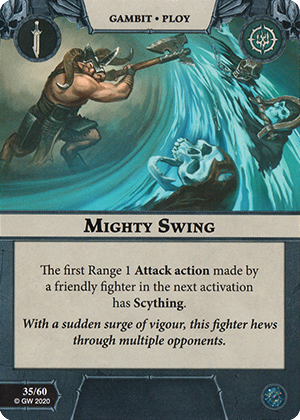 at one point. Would all that have happened anyway? Maybe. Still, our post-game chat definitely confirmed what I’d suspected at the time, which was that the fear of the card was enough to dictate the decisions he made in that early sequence. Maybe my “performance” helped sell it, maybe it didn’t, but there’s nothing wrong with giving your opponent a little nudge when they are about ready to make a mistake, just make sure to keep it friendly and, again, within the confines of the rules.
at one point. Would all that have happened anyway? Maybe. Still, our post-game chat definitely confirmed what I’d suspected at the time, which was that the fear of the card was enough to dictate the decisions he made in that early sequence. Maybe my “performance” helped sell it, maybe it didn’t, but there’s nothing wrong with giving your opponent a little nudge when they are about ready to make a mistake, just make sure to keep it friendly and, again, within the confines of the rules.
Conclusion
A little shorter than my usual articles, but it’s a topic that doesn’t really lend itself to a long conversation. That being said, I hope I still managed to pack some useful tidbits into this one, and I hope you enjoyed the little bit of story time at the end. As has been the goal with my other articles in this series, I wanted to highlight underutilized aspects of the game that you may not have been considering before. While there are a lot of avenues to gain an advantage by leveraging hidden information, the most important thing is how you do it. The vibe we are looking to hit is “friendly, yet mysterious.” It can be a fine line to walk, but if you go too friendly, you may overshare or simply be viewed as disingenuous. Conversely, if you go too stoic, you can come across as rude or problematic. It’s something I’m still working to balance myself, as I do think I tend to lean toward the more stoic end of things. Find the balance that works for you, but, wherever you land on this spectrum, make sure it doesn’t interfere with your (or your opponent’s) enjoyment of the game.
That’s all for this time. Thanks again for reading and please let me know if there are any topics you’d like to see addressed in future installments of this series. Until then, we wish you the best of luck on YOUR Path to (hidden) Glory!

